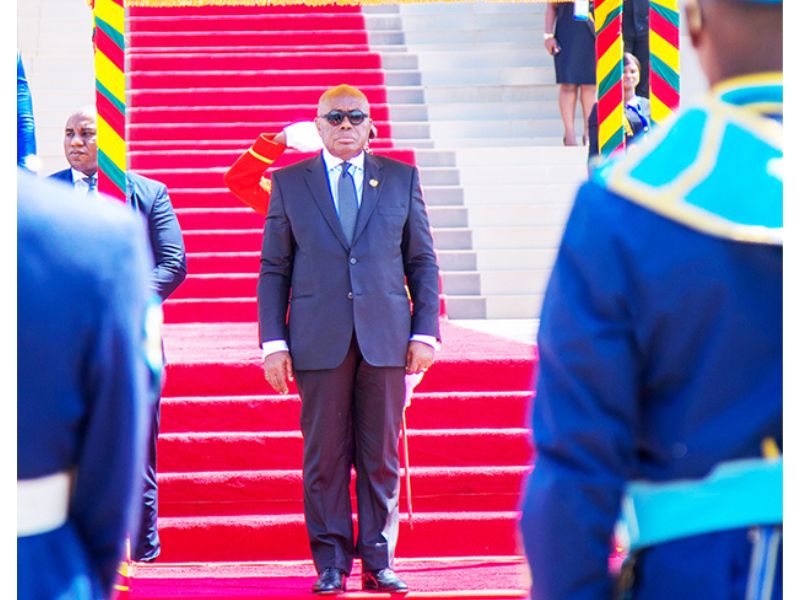The President, Nana Addo Dankwa Akufo-Addo, has expressed contrary opinion to those who say his government has over borrowed and spent recklessly.
It is the firm position of the president that his government has rather spent money on things that were urgent.
These things, he listed, among others, as building roads and bridges, schools to train young people and equip them to face a competitive world.
President Akufo-Addo said this on the floor of Parliament yesterday whilst delivering the State of the Nation Address (SONA), as mandated by the 1992 Constitution.
It is the view of the president that, considering the amount of work that must still be done on the road sector, which he said took a chunk of the money he borrowed, the bridges and classrooms that have to be built and access to potable water, among others, “I daresay no one can suggest we have over borrowed or spent recklessly.”
The Akufo-Addo government has been severely criticised by the opposition political parties, especially the National Democratic Congress (NDC), for over borrowing but has nothing to show for it.
Ghana’s total public debt stock shot up to GH¢575.7 billion at the end of November 2022, according to new data released by the Bank of Ghana. The new debt figure brings Ghana’s Debt-to-Gross Domestic Product (GDP) ratio to 103% by the end of 2022.
President Akufo-Addo, however, debunked the impression created by the opposition that the debts being serviced were only contracted during the period of this administration. He insisted that the GH¢575.7 billion debt is the total sum of borrowings since independence.
IMF JOURNEY
As a result of the economic challenges facing the country, the government in July, 2022 reluctantly beseeched the International Monetary Fund (IMF) for fiscal credibility.
In his address yesterday, President Akufo-Addo admitted that the US$3 billion facility from the IMF would not salvage the economy overnight, but would propel it to safe ground.
The President was aware that, given the extent of the fiscal and debt sustainability issues his government is addressing, fiscal adjustment and structural reforms were not sufficient for the restoration of debt sustainability.
He, therefore, reiterated that a critical component of the measures being implemented to address the current economic crisis is the debt operation, involving both domestic and external debt, a step toward meeting the conditions under the IMF deal.
The debt operation is aimed at returning the country to a debt-sustainable path by 2028 by reducing the Debt-to-GDP ratio from 103% in 2022 to 55% by 2028 and the external debt service-to-revenue ratio from 29% in 2022 to 18% by 2028.
It is public knowledge that the much-needed facility to be provided by the IMF risks hitting a snag, following the non-passage of three revenue bills.
Yesterday, President Akufo-Addo had cause to appeal to the Legislature to expedite work on these bills, which he described as key and needed the urgent attention of the House “to complete the prior [IMF] actions.”
These outstanding bills are the Income Tax (Amendment) Bill, Excise Duty and Excise Tax Stamp (Amendment) Bills, as well as the Growth and Sustainability Levy Bill.
Touching on the cooperation from external creditors, the president was optimistic once again, that should these bills also be passed, it would place the government in readiness for its presentation before the Fund’s board and hopefully secure a deal by the end of March.
HEALTH
The president expressed worry over the shortage of childhood vaccines, which appears to be a global phenomenon, as the World Health Organisation (WHO) has also expressed concern over its steady decline.
The WHO attributes the decline in measles vaccination coverage globally to the concentration on the fight against COVID-19.
Nonetheless, the President indicated that the Ghana Health Service has developed an elaborate programme to catch up on children who have missed their vaccinations, immediately stocks arrive.
TRADE
The President outlined some measures the government intends to roll out to enhance local production, aimed at reducing import bills while providing job opportunities.
He mentioned the ban on some products, whose modalities for implementation, he noted, had been prepared pending Parliamentary approval and subsequent implementation by the new Minister for Trade and Industry.
The one-hour and 20-minute address also touched on education, energy, digitalization, and agriculture.
Meanwhile, the full speech is published on www.thechronicle.com.gh.








